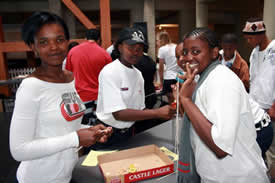| 90% of readers believe that mobile technology and increasing online access make social media an ideal platform for attracting younger generations of South Africans to SET fields of study. | |
| 5% of readers say they are not sure. | |
| 5% of readers say that this time and money could be better spent on outreach projects. |
Exoplanet extraordinaire… Only a few weeks into the new year and already four new exoplanets have been discovered. An exoplanet is a planet that orbits a star in a solar system other than that of the earth. It looks as though 2012 is going to be a year filled with discovery.
Read more
OUT AND ABOUT
Science clubs – the new buzzword at schools
 |
Who said science clubs were boring? These students prove this assumption wrong as they excitedly prepare an experiment to see if they predicted the end results correctly. |
|
The popularity of science clubs at schools continues to grow at a rapid rate, with learners being more enthusiastic than ever to join clubs where they can learn together, share information, develop their skills and be challenged intellectually.
Science clubs are creating an opportunity for learners to develop skills that cannot be acquired in a formal setting. These clubs also become platforms for learners to socialise and develop problem-solving skills without adult involvement. Best of all, science clubs stimulate learners’ interest in science, engineering and technology.
The Department of Science and Technology has therefore decided to fund a science club initiative at 18 Dinaledi schools, under the able guidance of SAASTA. SAASTA’s Science Awareness Platforms and Science Education Units joined forces to set up the clubs; ensure that they have programmes filled with educational, informative, fun, interactive and challenging activities; and provide them with resources to get started.
Seventeen clubs were established in August and September last year, with the first step being to elect a committee to coordinate meetings.
As members of the clubs, learners are encouraged to organise speakers from industry, universities, national research facilities and professional/scientific bodies to address them on specific topics. They also organise educational excursions, make posters and demonstrate their favourite experiments.
Each school at which a club is established, is teamed up with a nearby science centre that helps to build up the club and ensure that its programme runs smoothly. For example, in the Eastern Cape, the Fort School of Science and Technology (FOSST) at the University of Fort Hare donated laptops to the science centres at schools in their area.
“We received an overwhelming reception at the schools and enthusiastic support from the science centre community,” says SAASTA’s Thandamanzi Mtsweni. “Some of the science centres, such as FOSST, have taken it upon themselves to provide more support to the schools than required. Learners are very excited about the project as it brings them together to share and debate intellectual issues.”
